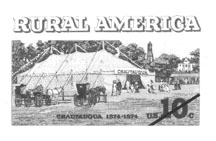
The tent Chautauqua, of which High Plains Chautauqua is an example, is often confused with the Colorado Chautauqua Association in Boulder and the Chautauqua Institution at Lake Chautauqua, New York. While all were founded with the same ideals of educational enrichment and self-improvement, their origins and format are quite different.
The first Chautauqua, in New York State originated in 1874 as a Methodist Sunday school teacher summer training camp and evolved into a popular educational summer camp for families. It is sometimes called the Mother Chautauqua because many independent “daughter” Chautauquas developed after the same pattern, in permanent facilities. At the height of their popularity several hundred existed, including Palmer Lake, near Colorado Springs, and the Boulder Chautauqua.
Keith Vawter, an owner of the Red Path Lyceum started the circuit, or tent, Chautauqua in 1904 as a way to provide rural America with programs similar to those being offered in Chicago's Redpath Lyceum.
A tent Chautauqua stayed in a community from five to seven days and offered a variety of cultural events morning, afternoon and evening. It then moved on to another community.
Politicians, writers, theologians and distinguished speakers and entertainers such as President Warren G. Harding, the young Edgar Bergen with his puppet Charlie McCarthy, Carl Sandburg, historian Ida Tarbell, William Jennings Bryan, and evangelist Billy Sunday appeared on the Chautauqua circuit. Music was also an important feature of Chautauqua.
The traveling tent shows became an integral part of small town Americana. At their peak, they appeared in over 10,000 communities to more than 45 million people. However, in the 1920s increased mobility, radio and the talking pictures, and a change in the national attitude brought an end to the movement. The Roaring Twenties were a time of fun, frolic and far less concern about self-improvement and inspirational messages.
In the 1970s, Everett Albers, North Dakota Humanities Council Executive Director, launched the modern humanities Chautauqua as a series of scholars offering first-person interpretations of historical figures. In costume, the Chautauqua scholar delivers monologues using the historical figure’s words and then answers questions from the audience as that person would have. Finally, the scholar steps out of character to answer questions that often explore how lessons from that character’s life and philosophy relate to us today. Several other state humanities councils followed suit.
Colorado Humanities launched High Plains Chautauqua in Greeley in August 2000. It quickly grew to be a full five-day living history festival attracting attendance numbers of over 7,000 each year. Colorado Humanities later also partnered with Grand Junction and Pueblo communities for two-day festivals in each of those locations.